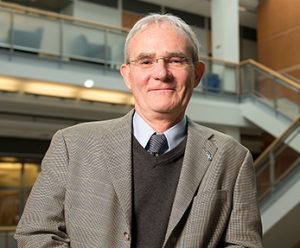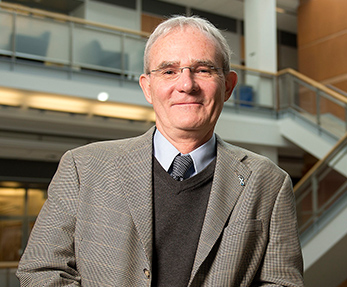This is the first in a series of profiles on UNC School of Medicine researchers. We will feature biomedical researchers throughout this 140th year of the school and beyond.

This is the first in a series of profiles on UNC School of Medicine researchers. We will feature biomedical researchers throughout this 140th year of the school and beyond.

Terry Magnuson, PhD, the Sarah Graham Kenan Professor of Genetics and Vice Chancellor for Research at UNC-Chapel Hill, is the new president of the Genetics Society of America, an international community of scientists dedicated to using genetics to make new discoveries and save lives.
Dr. Magnuson, whose career has spanned the fields of genetics, epigenetics, and developmental biology, began his tenure at the UNC School of Medicine began in 2000, when he was recruited from Case Western University as the founding chair of the now highly ranked UNC Department of Genetics, director of the Carolina Center for Genome Sciences, and director of the Cancer Genetics Program in the UNC Lineberger Comprehensive Cancer Center. Dr. Magnuson was appointed Vice Dean for Research at the School of Medicine in 2010, and was appointed to the university-wide role of Vice Chancellor for Research in 2016.
Dr. Magnuson’s lab has been at the forefront of developmental genetics, working with state-of-the art techniques in mouse models to understand the underlying genetic and cellular basis of early developmental phenotypes. His early work generated seminal knowledge of the impact of a variety of genes required for early embryogenesis, and he is recognized for his pioneering work on the regulatory role of chromatin in early development, particularly his comprehensive work on the albino deletion complex, which contains genes required for embryonic survival. This work resulted in the cloning and characterization of the mouse polycomb gene, eed, and contributed significantly to the current understanding of chromatin biology and developmental biology.
His parallel research on Brg1 – the mammalian Swi/Snf chromatin remodeling factor – uncovered new mechanistic roles for Brg1 in development and genome activation. He was also one of the first mouse geneticists to appreciate the impact of genetic background on phenotypic variation in targeted mutant mice.
Dr. Magnuson has published more than 200 articles in high-impact journals including Nature, Science, Cell, and Nature Genetics, and his work earned him election into the National Academy of Medicine, the American Academy of Arts and Sciences, and the American Association for the Advancement of Science.
He was named a Pew Scholar in the Biomedical Sciences, a Basil O’Connor awardee from the March of Dimes, and a Distinguished Alumnus Award winner from Cornell University.
To read more about Dr. Magnuson’s background and rise to become one of the foremost geneticists in the world, check out this School of Medicine Q&A.